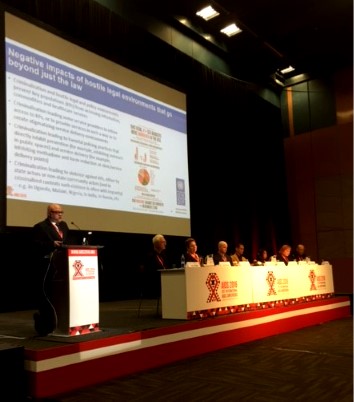Written by Nicole Ippoliti, Technical Officer II, FHI 360
Brave. Hopeful. Committed. Determined. These are the words that come to mind as I reflect on the inspiring researchers, programmers, activists, donors and policymakers who convened at the 21st International AIDS Conference in Durban, South Africa. Though we came from different countries and play diverse roles in the HIV response, we gathered in Durban united by a singular goal: to ensure that the health and human rights of key populations (men who have sex with men [MSM], transgender people, sex workers and people who inject drugs [PWID]) were fully represented at AIDS 2016. And so they were. Unlike prior years, key populations were a central focus at the conference, starting with the launch of the first-ever transgender pre-conference event, and culminating with announcements of renewed global funding for key populations through PEPFAR, the Elton John AIDS Foundation, and the Key Population Investment Fund.
It’s no accident that key populations were center stage at AIDS 2016. Without including key populations in both biomedical and structural interventions—which address the social, political and economic factors that make people vulnerable to HIV—we will not be able to successfully respond to the epidemic, let alone achieve the 90-90-90 goals set by UNAIDS by 2030. To achieve these goals, service delivery and programming led by key populations should be a priority in our response to HIV.
These values are at the core of LINKAGES programming, which is why at AIDS 2016 we hosted the symposium session, Repairing HIV service cascades that leak: Key population communities taking the lead. During this session, we explored how key population members themselves are delivering the HIV services they want and need. They are often doing so in hostile environments that hinder their access to services and contribute to damaging “leaks” in the cascade, or stages at which people drop out of the continuum of testing, treatment, and care. The United Nations Development Programme opened the session with sobering statistics about the harmful effects of the hostile legal environments in which many key populations live. For example, sex work is illegal in 109 countries and 15 countries impose the death penalty on drug users. These harsh legal and policy environments for key populations create formidable barriers to accessing life-saving HIV information, commodities and health care services.

The remaining panelists discussed the strengths and challenges of key-population-led service delivery approaches in Haiti, Kenya, South Africa, Indonesia and the United States. In Haiti, for example, service providers lack the skills and sensitivity to address the HIV-related needs of key populations. In response, LINKAGES Haiti is testing two service new delivery models: stand-alone clinics for MSM and female sex workers, and private sector “preferred providers” who understand key population health issues. The goal is to increase the number of key population members who get tested for HIV and to encourage those who are HIV-positive to begin and remain in care and treatment. In South Africa, the Anova Health Institute, in partnership with the Department of Health, has provided clinical training on the health needs of MSM to more than 5,000 service providers at 250 health care clinics. In Indonesia, LINKAGES is working with, PKNI, a coalition of self-organized drug user groups across the 19 provinces with the highest prevalence of HIV and injecting drug use. PKNI is providing comprehensive and quality harm reduction services (such as safe needle and syringe exchanges or opioid substitution therapy) in 11 different provinces for PWID and other key populations who inject drugs. Due to their success as an advocacy group, PKNI has been invited by the National AIDS Commission to become an official partner in implementing HIV programming and policies at both the provincial and national levels. In Kenya, the Sex Workers Academy, led by a faculty of trained sex workers, provides leadership, project management and advocacy training to male and female sex workers strengthen their ability to provide rights-based HIV/STI programs and services to their peers. The Academy has been met with incredible success and is scaling up to implement training sessions in other African countries. The Center for Excellence on Transgender Health in San Francisco concluded our session by explaining how the best practices for reaching, engaging and retaining trans women into care are rooted in addressing social and environmental factors that affect how people live. Interventions that offer access to job training, affordable housing, mental health services, and social support are those that have demonstrated success in sustaining change in trans people’s lives.
It is clear that more than 40 years into the HIV epidemic, we are still struggling with cascades that leak. The time has come to empower key populations to lead the way in the HIV response. The time has come to work together to ensure that members of key populations are supported to get tested for HIV and get the ongoing care and treatment they need.

